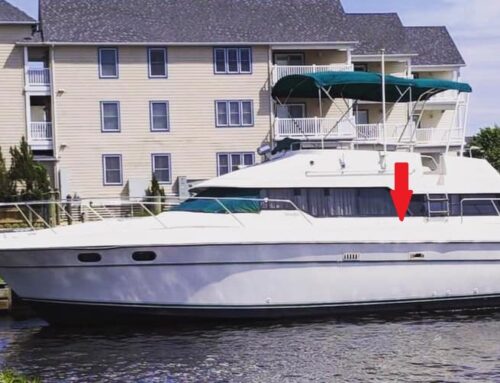One thing I’ve learned in my short six months of yacht ownership is that “pirates” still roam the Pamlico Sound, just as Blackbeard laid in wait in these very waters for his unsuspecting merchant victims 300 years ago. This piece of cautionary wisdom has been repeated to me many times by seasoned sailors, especially because my husband and I are nautical novices and the owners of a fixer upper. When today’s pirates see us coming, gold doubloons dance before their eyes. I have to say that so far we’ve done pretty well at keeping their grappling hooks off our bank account. Just for fun, here are three examples:
First, we needed to get a cleat (that little but important metal piece for tying dock lines, etc.) replaced;
- Pirate estimate: Two men, two days, $1000+
- Chock up one for the landlubbers: One yacht expert, 30 minutes, $70.
Second, during Hurricane Isaias, the excess line from one of our dock lines got blown off the dock and wrapped itself around something under the boat. We could not budge it, and there was no way I was putting on scuba gear to go exploring under 20 feet of black water.
- Pirate diver’s estimate: $500+. $350 to drive 2 miles to the marina plus $150/hour.
- Landlopers’ victory: $62, and we now have an expert, go-to diver named Catfish.
Third, this one didn’t happen to us, but it has happened to many boaters who’ve warned us. Hauling out to dry dock in a shipyard–whether for routine maintenance or hurricane protection–is risky business. Sailors have to be careful about which shipyard they choose. It can be like the Hotel California, “You can check out anytime you like, but you can never leave.” When it comes time for a boat owner to leave a disreputable shipyard, the shipyard-pirates often have mysterious complications arise. The one we hear most often is a problem with a crane or other exit issues, which result in extended daily charges to the tune of thousands in additional fees while the sailor is held hostage.
What’s the connection here to entrepreneurship (besides the “ship” part, of course), and what have I learned?
I’m not saying, and I don’t believe, that our world is full of pirates with bad intentions. But I am saying that you, as an entrepreneur, need to be very careful of what messages you believe, to whom you give your money, and what you actually get in return. Entrepreneurs are barraged with messages, some of them beneficial and some of them detrimental and costly.
I call the latter messages Pretty Little Entrepreneurial Lies:
- You’re a rock star!
- You cannot fail if you____.
- I got rich, and you can too – FAST!
- You don’t need to know how to_____ (fill in a sound business principle here).
A pretty little lie is something that’s not true, but it’s said so often that people don’t question it.
If you’ve recently started a business or are thinking about it, you may have heard one or more of those pretty little lies. And I bet you REALLY wanted to believe them because they made success sound so easy. You may have even bought into one or two of them hook, line, and sinker. And here you are, a poorer but wiser (I hope) entrepreneur.
Why do so many smart people fall for these lies? One, because there’s an element of truth in some of them; two, because there’s a small part of people that wants “too good to be true” to actually be true; and three, people get desperate.
Pretty Little Lie Number 1: You’re a rock star!
Madonna is a rock star. You probably are not. That’s not to say you’re not incredible in many ways. But get an honest grip on your skills, talents, and characteristics.
When you’re starting and growing a business, you are going to get more opinions than you can shake a stick at. They will come in mainly two varieties: “You are the most powerful “xyz” to ever walk the planet–there’s no way you’ll fail!” (Aw, thanks, Mom!) Or: “Are you kidding me, you’re going to bomb hard and fast!” (This from someone who did bomb hard and fast.)
Erase cheerleaders and naysayers from the list of things you need to start or grow a business. What you do need might include business advisors, financial consultants, legal experts, successful business owners, a like-minded inner circle, and a trusted partner.
Your business will not succeed based on false ego-stroked or sabotaged emotion but on sound business practices.
Pretty Little Lie Number 2: You can’t fail if you do this__________.
Frequently, I read posts in entrepreneurial social media groups by people who say, “I’ve done everything this expert said, but I haven’t made a dime in eight months.” The truth is, there is no one simple strategy that guarantees entrepreneurial success. There are far too many elements that go into running a business.
Funnels, Facebook ads, or financial mindset are fine strategies, but without all of the necessary solid business principles to go with them, they alone are not going to work.
Pretty Little Lie Number 3: I got rich, and you will too – FAST!
There are some exceptionally successful entrepreneurs who widely market their wealth, success, and happiness. They want you to buy their one secret sauce to success. Look how rich, how beautiful, how energetic and positive they are! Many of them sell the mirage that you can have it all just like them in just a few short months. But read their back stories: many of the most successful entrepreneurs struggled for years or decades, went bankrupt, lost their health or their families before they finally made it. What they know but aren’t telling you is that short-term success is extraordinarily rare; enormous, lengthy struggle is almost universal. If you think you’re going to give somebody $47 or $20,000 and then turn that around into sustained millions in no time at all, you have an overabundance of trust and a blind eye. There may be a case or two out there where that’s actually happened, but those instances are exceedingly rare, and I don’t know about them.
If you aren’t willing to put in the work and the learning and the time to actually start, grow, and manage a successful business, you will almost certainly fail.
Pretty Little Lie Number 4: You don’t need to know how to _________ (fill in a sound business principle here)
No business is one-dimensional. Why do so many tech startups make millions in their first year and go belly up by the end of year two? Multiple studies of small businesses have come to the conclusion that most entrepreneurs fail (and most do) because of poor entrepreneurial skill sets. The overwhelming majority of providers selling to entrepreneurs are selling one product — one leadership skill, or one marketing strategy, or one sales technique. It’s like giving you a rip cord without a parachute. It may seem exhilarating at first, but it won’t make your skydive a success. I recently came across a new provider who wants to show you the one-strategy fast track to becoming a CEO. That’s good stuff, right? But are they also going to show you how to be a VP of Sales, a Marketing Director, an HR Specialist, a Product Manager, or a Director of Finance?
Unless you have beaucoup capital, you’ll need to pile all those hats on top of your CEO cap.
Take heart, Matey. Just like in the boating business, not everyone is a pirate. Do excellent research. Get honest, first-hand testimonials and recommendations. Keep your eyes wide open and put your trust in proven, honorable captains so that you don’t get waylaid by the pretty little liars and entrepreneurial pirates.
No rainbow colored smoke and mirrors at Beth Strange Strategy and Abundant Way. I stand for transparent, candid, forthright product and service. I won’t sugarcoat the effort and strategy required for you to make forward progress.
Others have done it, and you too can navigate safely through the inevitable rough waters of entrepreneurship and reach a profitable and abundant destination.








